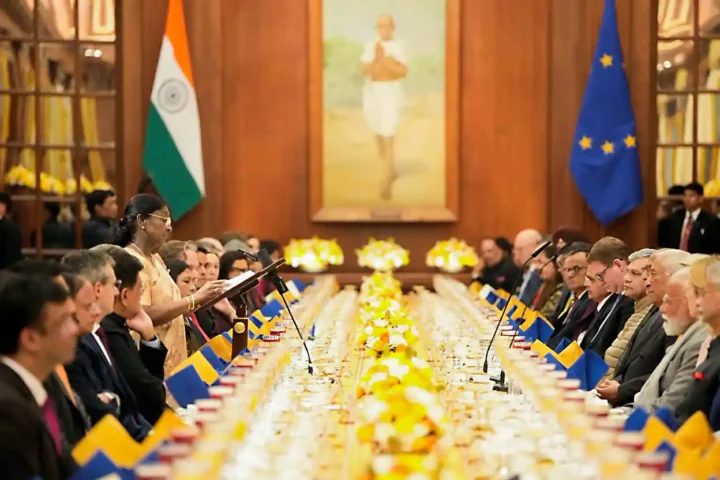In the hushed buzz of a packed Turkish restaurant on Monday night, two of Labour’s old power brokers — Peter Mandelson and No. 10 Chief of Staff Morgan McSweeney — took centre stage at a party fundraiser. Their message: governing is harder now than ever. But even as they spoke, the real storm was brewing just a mile away.
Inside Parliament, more than 100 Labour MPs were mounting a rebellion that took Downing Street by surprise — rallying behind an amendment to halt Prime Minister Keir Starmer’s proposed £5 billion cuts to disability benefits. The sheer scale of the uprising sent shockwaves through the party’s leadership and exposed growing fractures within Labour’s commanding 402-seat majority.
The amendment not only challenged a key pillar of Starmer’s policy agenda but also cast a spotlight on tensions that have long simmered beneath the surface: disillusionment with centralised leadership, frustration over lack of communication from No. 10, and resentment among MPs who feel they’ve been sidelined by the party’s inner circle.
‘Delivery-First’ Leadership Meets Growing Discontent
Starmer’s leadership, often defined by its streamlined, no-nonsense focus on “delivery,” is increasingly being questioned by his own backbenchers — many of whom have barely exchanged words with the Prime Minister since their election.
“I’ve never had a conversation with him,” said one newly elected MP. “He’s never sent me a note congratulating me. I doubt he knows who I am.”
Such sentiments are no longer rare. Several Labour MPs told POLITICO, anonymously, that they feel ignored, unheard, and undervalued — especially as Starmer’s top aides, particularly McSweeney, continue to guard policy and promotion decisions tightly.
Some of the most vocal frustration is coming not from Labour’s traditional left flank, but from the so-called “soft left” — a cohort initially supportive of Starmer’s centrist vision, but increasingly wary of his government’s top-down approach.
“There’s no engagement,” said one MP. “It’s astonishing really.”
‘Us and Them’ Inside the Party
Labour’s political machine was built for electoral victory, and it delivered just that last year. McSweeney’s operation, known for ruthless candidate selection and rigid message discipline, earned the team the nickname “Starmtroopers.” But with the election won, cracks are beginning to show.
“There’s more of an ‘us and them’ mentality between parliament and No. 10 than was necessary,” said one frontbencher, highlighting the Prime Minister’s minimal presence in common MP haunts like the Commons tearoom or the Stranger’s Bar.
Another Cabinet member admitted: “Lots of colleagues just don’t feel they are listened to or have a way to shape policy.”
The political fallout from the welfare cuts appears to be a tipping point, but the discontent has been building for months. With whispers of a reshuffle in July, MPs are acutely aware that time to leave a legacy — or secure a ministerial role — is slipping away.
“I don’t want to have spent four years of my life as lobby fodder,” said one MP bluntly.
Factionalism Returns — Quietly
While Labour’s leadership has kept traditional left-wing dissent under tight control — punishing some Socialist Campaign Group members for past rebellions — new groupings are quietly emerging. These include alliances based on region, ideology, or policy focus, such as the trade union-aligned Labour Future, and MPs focused on housing, rural issues, or social conservatism.
Even long-time loyalists admit that a reset may be needed. “They are not spoken to, they’re not listened to … their thoughts just aren’t considered,” said one senior government figure. “I don’t think it’s a fundamental breakdown, but it is about an urgent need for a radical shake-up.”
One regional Labour mayor added pointedly: “There are too many books being read in No. 10 about Machiavelli, and not enough about charm and love.”
Welfare Cuts a Flashpoint — and a Warning
The rebellion over disability benefit cuts was notable not just for its size, but for who joined it. Even centrist MPs signed on — some without realizing the full consequences, insiders say — signalling a deeper unease about how policies are being developed and communicated.
Starmer has scrambled to regain control, phoning rebels and floating concessions. But whether these moves are enough to quell internal unrest remains uncertain.
“I think it’s blown into the welfare bill in particular, but it’s part of a wider frustration,” said one Cabinet minister. “Some of it is reasonable — they want to be listened to and involved.”
What Comes Next?
Speculation is rife in Westminster that the welfare row could trigger resignations from the frontbench. Although Downing Street hopes planned compromises will prevent that, trust has clearly eroded.
Some MPs say Starmer and McSweeney are focused on the long game — personnel changes and political capital banked for the next general election. But others warn that Labour’s vast majority may become its greatest liability if discontent continues to fester.
As one Labour MP put it, “It’s open season now. Everyone’s found their voice — and they’re not afraid to use it.”
What began as a silent grumble on the backbenches is now a growing chorus. And with four years until the next election, Keir Starmer may find that managing his party is the hardest part of governing.











